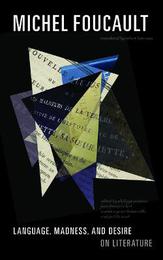
|
Language, Madness, and Desire: On Literature
Hardback
Main Details
Description
As a transformative thinker of the twentieth century, whose work spanned all branches of the humanities, Michel Foucault had a complex and profound relationship with literature. And yet this critical aspect of his thought, because it was largely expressed in speeches and interviews, remains virtually unknown to even his most loyal readers. This book brings together previously unpublished transcripts of oral presentations in which Foucault speaks at length about literature and its links to some of his principal themes: madness, language and criticism, and truth and desire. The associations between madness and language-and madness and silence-preoccupy Foucault in two 1963 radio broadcasts, presented here, in which he ranges among literary examples from Cervantes and Shakespeare to Diderot, before taking up questions about Artaud's literary correspondence, lettres de cachet, and the materiality of language. In his lectures on the relations among language, the literary work, and literature, he discusses Joyce, Proust, Chateaubriand, Racine, and Corneille, as well as the linguist Roman Jakobson. What we know as literature, Foucault contends, begins with the Marquis de Sade, to whose writing-particularly La Nouvelle Justine and Juliette-he devotes a full two-part lecture series focusing on notions of literary self-consciousness. Following his meditations on history in the recently published Speech Begins after Death, this current volume makes clear the importance of literature to Foucault's thought and intellectual development.
Author Biography
Michel Foucault (1926-1984) was a French historian and philosopher associated with the structuralist and poststructuralist movements, whose work has been widely influential throughout the humanities and social sciences. Some of his most notable titles are Madness and Civilization, Discipline and Punish, and The History of Sexuality. Robert Bononno has been a translator from French for more than twenty years. His recent nonfiction translations include Toward an Architecture of Enjoyment, by Henri Lefebvre (Minnesota, 2014), and Speech Begins after Death, by Michel Foucault and Claude Bonnefoy (Minnesota, 2013).
|